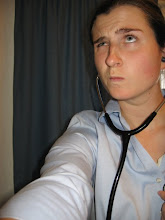I always get sick when I go home and visit my family. Always! In the past I have found it very irritating. You have a free weekend a couple weeks before finals and go up to see the fam. You arrive and an adoring sister with copious nasal discharge gives you a huge hug and proceeds to use your jacket as a make-shift kleenex for her nose. 3 days later you go back to your house in Seattle, develop a sore throat, runny nose and a fever and you realize you have killer viral illness #8 of the season. 10 days later you feel better, but not before giving said killer viral illness to several classmates, undoubtedly resulting in the loss of a couple friendships. A couple months later, all is forgotten and you go home to visit the family again, only to have the process repeated.
HOWEVER, on my peds rotation it came in handy. And when I say handy, I mean really handy. The other medical student on my pediatrics rotation fell seriously ill, not once but twice. He developed a high fever resulting in the inability to get out of bed for several days, and actual hallucinations. During this time I also developed a little bit of a scratchy throat for a day or two which quickly resolved. It seemed like my body was fighting off a lesser version of something awful it had encountered before. (I don't mean to imply that I have a killer immune system or that I never get sick. I actually get sick a lot, it is just that pediatrics clinic can't hold a candle to the immune challenge you get from hangin' with a family that has 13 kids).
Apparently, it is very common for medical students to fall very ill during their pediatrics rotation. We were warned about this, and staff commented that the acquiring of severe illness from peds clinic seems to occur more often with people who are only children growing up or had fairly clean living environments. Well, not a problem here! :)

Here my (fun and terrific) family has been labeled by name. However, perhaps the could also each be labeled as "Immune challenge #1," "Immune challenge #2," etc.
 Baby post c-section being held by female relative of the mother. (Photo taken with permission).
Baby post c-section being held by female relative of the mother. (Photo taken with permission). Why you have to change into rubber rain boots before doing a c-section (frequently a bloody/messy procedure).
Why you have to change into rubber rain boots before doing a c-section (frequently a bloody/messy procedure). Before assisting with a c-section.
Before assisting with a c-section. Catholicism and Medicine have never been combined so well as the crucified Jesus above an eye chart and patient intake table.
Catholicism and Medicine have never been combined so well as the crucified Jesus above an eye chart and patient intake table.














